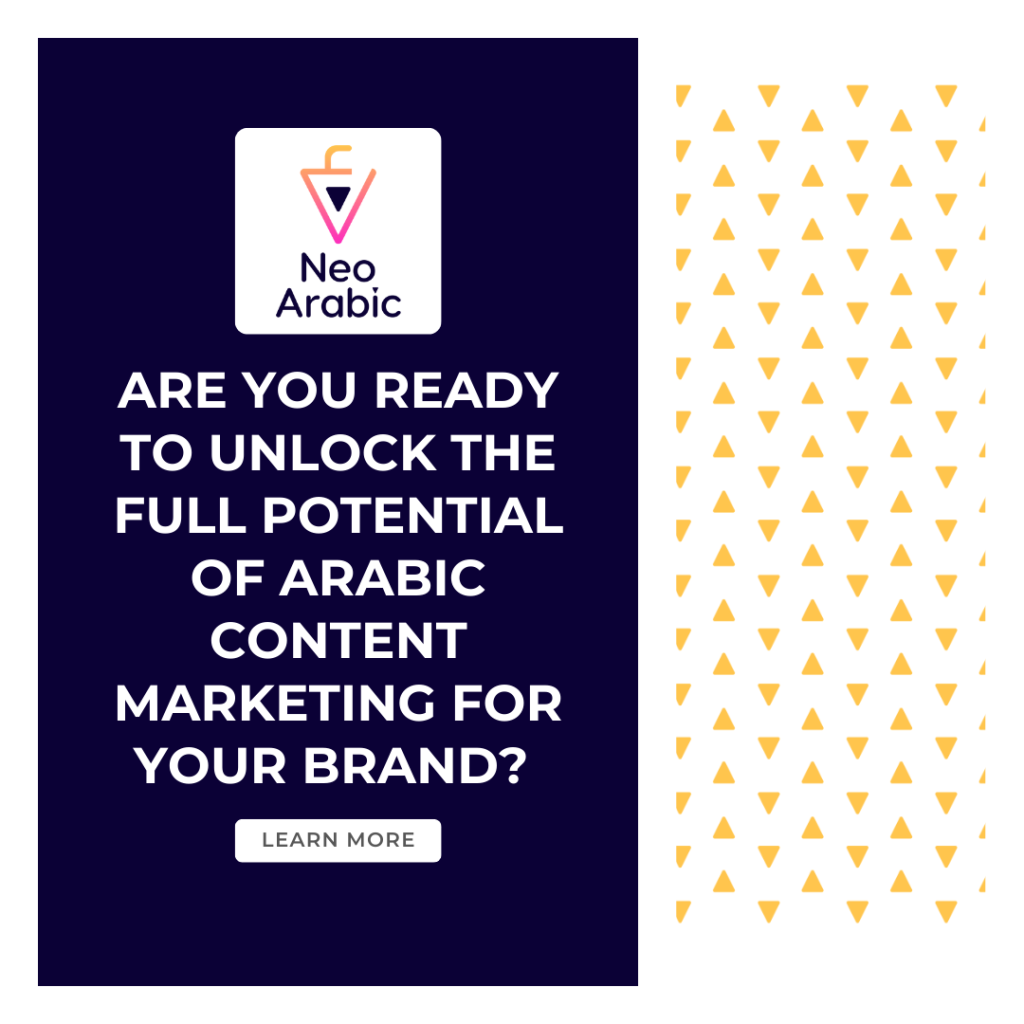Arabic Content marketing for B2B enterprises encounter the need for seamless communication with Arabic-speaking audiences. By tailoring content to resonate with cultural nuances and linguistic preferences, businesses can forge stronger bonds and expand their presence in this thriving market. Let’s delve into the pivotal role and transformative potential of Arabic content marketing in driving B2B success throughout the Middle East.
Arabic Content marketing for B2B
- Audience Understanding: it requires thorough research into the specific needs, preferences, and behaviors of Arabic-speaking B2B audiences. This includes understanding their industry, challenges, pain points, and decision-making processes.
- Content Creation: Once the audience is understood, the next step is to create high-quality content in Arabic that resonates with them. This content can take various forms, including articles, blog posts, whitepapers, case studies, infographics, videos, and social media posts.
- Localization and Cultural Sensitivity: Effective Arabic content marketing requires more than just translation. It involves localization, which entails adapting the content to fit the linguistic, cultural, and social nuances of the target audience.
Learn More About: Cultural Sensitivity in Arabic Translation
- Distribution Channels: Choose the right platforms for sharing Arabic content. These could be industry websites, forums, social media, email newsletters, or networking events.
- Search Engine Optimization (SEO): Optimizing Arabic content for search engines is essential for increasing visibility and driving organic traffic. This involves conducting keyword research in Arabic, optimizing on-page elements such as titles, meta descriptions, and headings, and building high-quality backlinks from relevant Arabic-language websites.
- Engagement and Interaction: This may involve responding to comments and inquiries in Arabic, participating in relevant discussions and forums, and leveraging user-generated content to amplify reach and credibility.
- Measurement and Optimization: Like any marketing initiative, it’s essential to measure the effectiveness of Arabic content marketing efforts and make data-driven optimizations. This may involve tracking key performance indicators (KPIs) such as website traffic, engagement metrics, lead generation, and conversion rates, and making adjustments to the strategy based on insights gathered.
Read More: How To Create an Arabic Content Marketing Plan for 2024?
Why Is Content Marketing Important for B2B?
Arabic content marketing is crucial for B2B businesses for several reasons:
- Access to a Large Market: Arabic is spoken by over 420 million people worldwide, making it one of the most widely spoken languages. By creating content in Arabic, B2B businesses can tap into this vast market and reach a larger audience of potential customers and partners.
- Cultural Relevance: Language is deeply tied to culture, and creating content in Arabic shows respect for the cultural identity of the target audience. It demonstrates a commitment to understanding their needs, preferences, and values, which can help build trust and credibility.
- Competitive Advantage: In many industries, the competition for B2B customers is fierce. Offering content in Arabic can give businesses a competitive edge by catering to a segment of the market that may be underserved or overlooked by competitors who only communicate in English.
- Enhanced Engagement: Studies have shown that people are more likely to engage with content that is in their native language. By providing content in Arabic, B2B businesses can increase engagement levels, leading to higher levels of interaction, shares, In addition to ultimately, conversions.
- Improved SEO Performance: Creating content in Arabic can also improve a company’s search engine optimization (SEO) performance in Arabic-language search engines like Google.ae. This can increase visibility and attract more organic traffic from Arabic-speaking users searching for relevant products or services.
- Facilitates Relationship Building: Effective communication is the cornerstone of building strong relationships with B2B clients and partners. By offering content in Arabic, businesses can better connect with Arabic-speaking stakeholders, facilitating smoother communication and relationship-building efforts.
- Expanding Global Reach: As businesses continue to expand their operations globally, having Arabic content can support these efforts by enabling companies to penetrate markets in the Middle East and North Africa region, where Arabic is predominantly spoken.
How To Start in Marketing For B2B?
- Set Clear Goals: Begin by defining what you want to achieve with your Arabic content marketing efforts. Whether it’s increasing brand awareness, generating leads, or driving sales, having clear goals will guide your strategy.
- Understand Your Audience: Take the time to research and understand your Arabic-speaking B2B audience. What are their pain points, interests, and preferences? This insight will help you create content that resonates with them.
- Start with a Basic Strategy: Don’t overcomplicate things initially. Begin with a simple content strategy outlining the types of content you’ll create, the topics you’ll cover, and how you’ll distribute it.
- Create Basic Content: Start creating basic content in Arabic based on your strategy. This could include blog posts, articles, or social media posts that address common challenges or provide valuable insights to your audience.
- Optimize as You Go: Pay attention to audience response as you publish content. Adjust your strategy and content based on feedback and performance metrics to ensure effectiveness.
- Gradually Expand Your Efforts. Once you’ve established a foundation, begin to broaden your Arabic content marketing initiatives. Experiment with different content formats, channels, and tactics. Determine what resonates best with your audience.
- Monitor and Measure: Keep a close eye on the performance of your Arabic content marketing activities. Track metrics like website traffic, engagement, and conversions regularly. This will help you gauge the effectiveness of your efforts.
- Learn and Iterate: Use the insights gathered from your monitoring and measurement efforts to learn what works and what doesn’t.
In conclusion,
Arabic content marketing for B2B offers a powerful avenue for businesses to expand their reach and establish meaningful connections in the Middle East. By crafting culturally relevant and engaging content, companies can effectively engage with Arabic-speaking audiences and unlock new growth opportunities. Embracing this approach will not only drive brand awareness but also foster long-term relationships that drive business success in the region.
